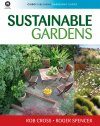![Sustainable Gardens Sustainable Gardens]()
Click to have a closer look
About this book
Biography
Related titles
About this book
Our gardens are a microcosm of nature; the ecological processes that go on in a garden mirror those operating on a global scale. The better we understand and quantify these cycles and processes, as they operate on both large and small scales, the more effective our management strategies will be. Sustainable Gardens introduces the reader to the historical context of the global, national and local environmental issues that confront us and examines the idea of sustainable living as a means of addressing these issues.
Sustainable Gardens draws attention to the new discipline of sustainability science with its emphasis on environmental accounting, and how this is being applied at the global, national, country, household and individual levels to establish benchmarks, set management goals, assess trends and measure progress towards sustainability. The contribution of parks and gardens to sustainable living is assessed by quantifying the horticultural consumption of energy, water and materials. A discussion of how gardens can make a major contribution to a sustainable future through increased food production and a close connection with the local environment is also included.Sustainable Gardens presents information in a non-technical format.
Sustainable Gardens synthesises sustainability issues, information, language, facts and figures that are currently widely dispersed through a range of media and difficult to access. It provides a context to the many ways in which we can manage our parks and gardens in a way that contributes to sustainable living. It considers ways to think sustainably when designing, constructing and maintaining gardens and landscapes.
Sustainable Gardens discusses and quantifies the ways that the garden ecosystem integrates with the biological, chemical and physical cycles and processes of the biosphere.
Customer Reviews
Biography
Roger Spencer (BSc (Hons.), MSc, PhD, Cert, Gard.) has worked at the Royal Botanic Gardens Melbourne for over 30 years. He is Senior Horticultural Botanist and has written many popular and scientific articles on horticultural topics including books on Elms, Grey and Silver Foliage Plants, Plant Names and, most recently, the 5-volume Horticultural Flora of South-eastern Australia. He began his scientific career as a member of a research team studying the ecology of Port Phillip Bay, Melbourne.
Rob Cross (BSc, BAppSci. (Hort)) is passionate about plants, their use and their conservation. Rob is a horticultural botanist at the Royal Botanic Gardens Melbourne where he works on the conservation and horticultural development of Australian plants, and has previously worked in the landscape design, garden maintenance and nursery areas of horticulture. Rob has written scientific papers, books on Japanese Flowering Cherries and Plant Names, and contributed to other horticultural books.



































